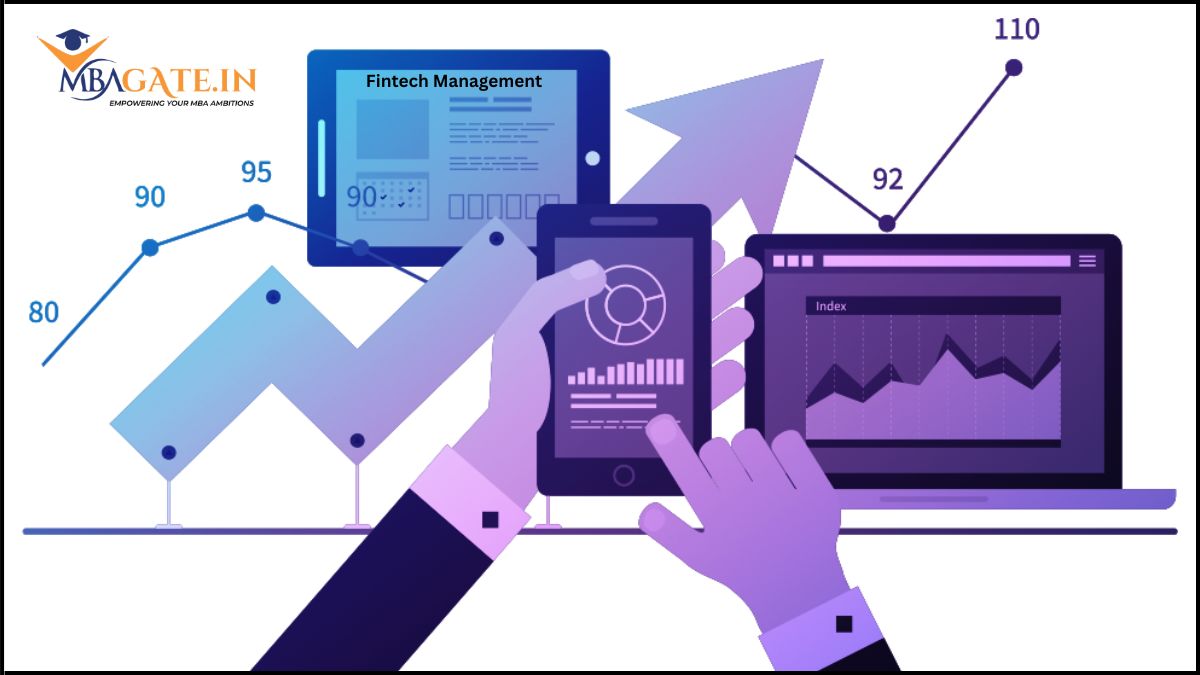MBA in Fintech Management
Table of Content
-
- + more items Show less
The MBA in FinTech Management trains students to lead financial institutions and technology-driven organisations. It covers digital payments, blockchain technology, cryptocurrency, robo-advisors, online loans and regulatory technology (RegTech). The curriculum also includes traditional management subjects like marketing, human resources, organisational behaviour and company strategy, combined with a firm foundation in financial technology tools and trends.
This program takes a minimum of two years to finish and offers both core and elective subjects. Core courses teach students a basic foundation in economics, finance and management, while electives enable them to delve deeper into fields like data science, financial analytics, blockchain use and digital banking. Industrial projects, internships and real case studies are also usually included in many programs for students to experience in real-life scenarios.
Students also learn hands-on for technologies such as Python, R, SQL and data visualisation tools necessary for data analysis of financial information and creating technology-oriented finance solutions. Some educational institutions may also offer certifications or workshops in collaboration with FinTech companies and banks.
To qualify for this program, applicants should have a bachelor's degree from a reputable university with appropriate qualifying marks. Certain colleges may require scores from admission tests like the CAT, GMAT or similar tests. Professional work experience in the field of finance, banking or IT is helpful, though not always required.
Once an MBA in FinTech Management is earned, one can find employment in digital banks, investment houses, insurance houses, payment processors, software companies, and regulatory bodies.

Highlights
The important details about the course, like the duration, eligibility criteria, and the top recruiters, are mentioned below. The students interested in this program may go through the table to learn more about the course.
What is an MBA in Fintech Management?
An MBA in Fintech Management is an MBA specialisation that deals with the integration of finance, innovation and emerging technology. It can make students learn to manage and create innovative financial products and services. These products and services are blockchain technology, digital payments and financial data analytics.
Students opting for an MBA in Finance will be able to learn about the whole business management course. The degree demands that students study finance-related courses such as risk management, investment management and corporate finance. An MBA in fintech is a special course where students learn about business management but apply technology to finance.
This program is best for students who seek to expand their knowledge and skills in Fintech and adjacent sectors. This program prepares and trains new-generation entrepreneurs with the capabilities required to make the financial ecosystem grow.
Entrance Exam
Entrance exams are necessary to join an MBA in FinTech course. They test general skills like maths, English and logical reasoning. The CAT (Common Admission Test) is the most popular exam and is used by the majority of India's best management schools. Some other well-known tests are GMAT (for global and Indian business schools), XAT (administered by XLRI), CMAT (administered by the National Testing Agency) and MAT (administered by AIMA).
Some private colleges and universities also conduct entrance examinations for MBA courses. These can be simpler and based on different patterns. Colleges also accept scores from tests like NMAT or SNAP.
These tests generally consist of sections on quantitative ability, logical reasoning, data interpretation, English language, and general awareness. The students have to prepare well in all sections so as to obtain a high score.
A good score on the admission test increases the probability of selection for further processes, such as group discussions, personal interviews and a written ability test. Some colleges also look for past academic performance and work experience.
In short, entrance tests are the initial and most important step towards admission into a good MBA in FinTech program. Students who prepare early and practise regularly have a better chance of getting high marks and admission to their desired college.
Eligibility
Admission to the MBA Economics program is as follows:
Students should have a bachelor's degree in any stream from a recognised institution. A minimum passing percentage of 50% or CGPA equivalent is permissible.
Students from the reserved category (SC/ST/OBC) are exempted by 5% from the mandatory passing percentage.
In their final year, students can apply after receiving a no-objection certificate from the principal.
A merit score above 60% is necessary to gain admission into premier colleges like the IIMs and IITs.
Students must perform well on the admission exam if they want to be admitted to the best colleges.
The Admission Process
The admission process for an MBA in Economics includes the following processes:
Students need to obtain a bachelor's degree with a minimum aggregate percentage of 50% and above at the time of graduation.
Students have to clear entry tests like the CAT, XAT, CMAT, SNAP, GMAT and other private university entrance exams, as required by individual universities. The cut-off or score will decide admissions to this course. Students' specialisations that they opt for do not completely determine their entry into MBA courses.
All shortlisted applicants must complete the online or offline admissions form and provide all required paperwork, including their Aadhar number, proof of residency, grade reports for their tenth and twelfth grades and their graduation grade report.
Shortlisted students who clear the entrance exams will then have to undergo a group discussion and personal interview. These rounds are meant to test students' ability to communicate and solve problems.
The final choice for institutions relies on the total score, which is calculated on the basis of the admission exam score, GD/PI response and work experience.
The scores on the entrance exam and interview decide who gets to join the MBA program in public policy finally. The weightage of the entrance exam and interview scores differs between colleges.
Students can read the documentation with the institution prior to paying the fees and joining extra classes.
Fintech Syllabus
An MBA in Financial Technology study could be a great option for those who want to make a real difference to the firm. Those students interested and proficient in fields like maths and computer science are more apt to take up this degree. To become a degree holder in the Fintech program, applicants should also be able to code and program. Fintech subjects cover business research practices, business procedures and systems, organisational communication and behaviour, corporate finance, marketing, digital business and so on.
Colleges
The table below lists the typical package fees for colleges and the names of the programs. It comprises the top government and private colleges. The top private college for this subject is SP Jain School of Global Management. The duration varies depending on the curriculum, ranging from nine months to two years.
Skill Development
Pursuing an MBA in Fintech Management provides students with an integrated set of skills that combine finance and technology. Upon graduation, students will have a good grasp of financial markets, investments and financial norms and regulations. With these skills, students will also acquire an appreciation of technology innovations that are transforming the future of finance, including blockchain, cryptocurrencies and artificial intelligence.
They possess robust analysis abilities to read financial information and market trends. These allow professionals to make sound choices. This course endows professionals with leadership as well as strategic thinking capabilities. This aids graduates to be able to tackle the intricacies of both fintech organisations and conventional financial institutions.
Through innovation and digital transformation, graduates learn how to implement technical knowledge into financial services, enhancing the efficiency of the company, client satisfaction, and overall success.
After the attainment of a degree in Fintech management, one acquires a range of skills as follows:
Development of Communication Skills: After graduating in BBA in Fintech, the person will be verbally conversant. Financial literacy refers to the capacity to convey the financial vocabulary and concepts. This is crucial because there might be stakeholders not from the finance industry.
Interpersonal skills, flexibility, and attention to detail are needed for any teamwork activity.
Development of Managerial Skills: The Fintech BBA program helps students hone their managerial abilities. Management skills are necessary for general managers, financial managers, operations managers and financial investment analysts to construct an annual, semi-annual or quarterly budget that establishes the amount allocated to each department.
Time management: Candidates with a BBA in Fintech learn time management techniques. The aviation business has extremely rigorous schedules. Time management enhances productivity, simplifies processes and minimises stress.
Lastly, an MBA in Fintech Management trains employees to thrive in the rapidly evolving financial landscape by delivering an in-depth understanding of business and technological developments.
Career Prospects
An MBA in Financial Technology offers scope for numerous types of job opportunities in conventional financial institutions, financial corporations, and new fintech organisations. Graduates of this program will be equipped to pursue careers like Fintech Analyst, Blockchain Developer, Risk Manager or digital transformation consultant because of their knowledge and skill in both finance and technology. Investment companies offer an array of career options. Fintech business MBA graduates are able to join a range of career paths, such as cryptocurrency analysts and digital asset portfolio managers, in these investment companies. There are a number of career options at Fintech companies.
Graduates in Fintech are highly sought after as regulatory acumen and innovation are of utmost importance in such firms. Additionally, the increased interest in data analytics in finance means that graduates can seek employment opportunities in data science and financial engineering. Fintech Management alumni, possessing finance and technical expertise, will be well-equipped to lead in a fast-changing industry, driving innovations in digital payments, peer-to-peer lending and insurtech.
Technical and analytical expertise: Aspirants have learnt Excel, Power BI, Tableau and SQL as tools for financial data analysis.
Financial and business acumen: Knowledge in finance at a higher level allows one to analyse business performance efficiently and make informed decisions. Proficiency with tools like Excel and applications like CFI (Corporate Finance Institute) is useful in Fintech. Lastly, trading and wealth management careers involve extensive knowledge of investment research, which includes stock markets, cryptocurrency and portfolio management.
Financial decision-making: Candidates are provided with financial decision-making options. Goals, finances and budget should guide financial decision-making. This involves analysing the return on investment and approximating the cost and benefits to the company of a project.
Future Scope
An MBA in Fintech is a blend of finance, business management and new technology. The course prepares the graduates to cope with the fast-evolving financial services sector. With the Fintech market growing at such a frantic rate globally, India's Fintech industry is forecasted to grow by 2025. There is a growing need for individuals with a background in both finance and technology. Graduates may have several different career options, which include financial analysis, investment banking, cryptocurrency and blockchain management, data analytics, cybersecurity and digital banking. Fintech Analyst, Financial Data Analyst, Risk Manager, Blockchain Developer and AI/ML Consultant for Financial Services are some of the most sought-after jobs.
Varied career opportunities: As the demand for Fintech graduates increases, so does the availability of work to them. Candidates with an MBA in Fintech have a variety of job options, including Risk Manager, Blockchain Developer, Financial Data Analyst, Fintech Analyst and AI/ML Consultant for Financial Services.
Range of Higher Education: With an MBA in Fintech, candidates are able to significantly augment their career prospects and reach executive positions. Graduates prefer to study an MBA with a Fintech, Finance or operations management specialisation, which blends financial and technical knowledge.
Some of the most important features indicate that Fintech management has a brighter future. They are as follows:
The third-largest industry globally is fintech.
Fintech companies capture at least 14% of Indian startup funding.
There are more than 9000 fintech startups in the current market.
The annual revenue is projected to grow over $190 billion by 2030.
Fintech firms account for 50% of broking accounts and 70% of digital payments.
Conclusion
This program is suitable for individuals who want to expand their knowledge and get a head start in a career in finance or technology. The program aims to teach and create new-age entrepreneurs to develop entrepreneurial skills to help the fintech ecosystem expand.
FAQs
Skills developed during an MBA in Fintech are:- Communication Skill, Technical skills, Financial decision-making skills, Managerial skills, Problem-solving skills.
Job roles after an MBA in Fintech are:- Analyst of Financial Data , Analyst for FinTech and Risk Manager, Blockchain developer, financial services AI/ML consultant, etc.









